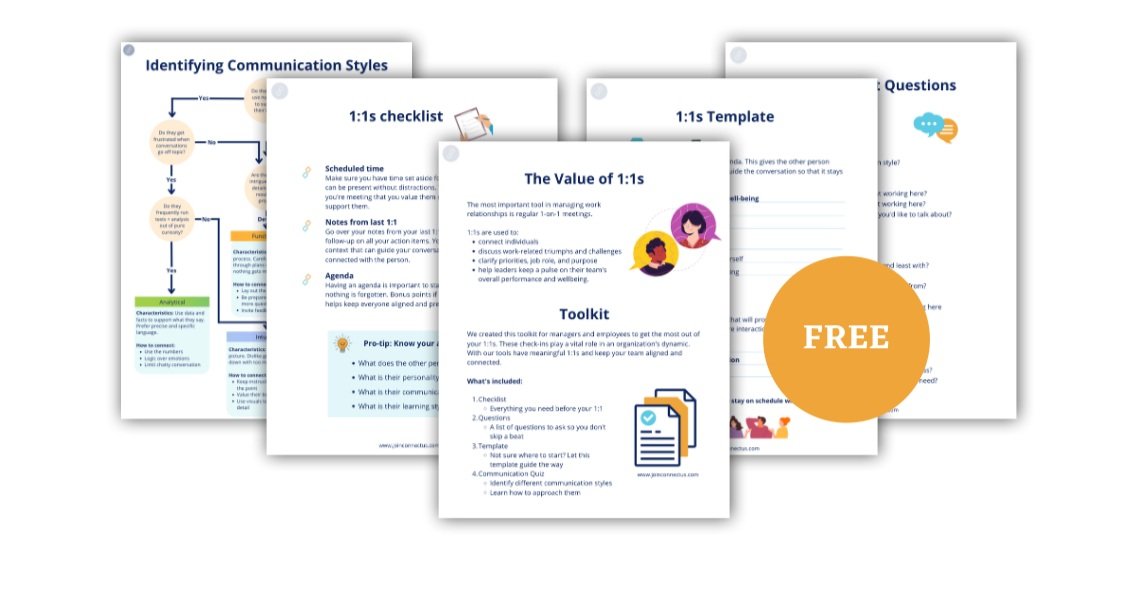The Manager’s Guide to Effective 1:1 Meetings
Maybe you’re asking yourself, “What is a 1-on-1?” Or maybe you’re telling yourself you don’t need to read this because, “How can 1:1 meetings be ineffective?”
1:1 meetings are critical to People Management, but simply meeting is not enough - make sure your 1:1s are effective with these tips. For this article, we are focusing on general 1:1s but it is important to know the key differences between General 1:1s and Performance 1:1s.
Continue reading to learn more about what 1:1 meetings are - or download our FREE 1:1 Toolkit for Managers for a printable 1:1 checklist, list of questions to ask, 1:1 template, and more.
1:1 Meeting Basics
Definition: Simply put, a 1:1 meeting is a brief and regularly scheduled meeting, between two individuals - usually between a manager and their direct report.
Frequency: The frequency of general 1:1 meetings is up to you, although we recommend it be every 1-2 weeks (this differs for performance 1:1s). It is important to consult with your organization to see if they have a suggested frequency (with our 1:1 Management Tool admin can set a frequency for all leaders within an organization to follow).
Objective: The purpose of a 1:1 meeting is to check in with individuals on your team and proactively support them. They are also a great opportunity to build rapport and get to know your direct reports more.
Benefits: On a high-level view, 1:1 meetings improve Employee Experience, Employee Engagement, and Employee Retention. However, we want to show you some specific day-to-day benefits for managers and individual contributors.
Best Practices for 1:1 Meetings
Schedule Them
This may seem like something that goes without saying but many managers spontaneously schedule 1:1 meetings, without realizing how important it is to have them scheduled. Having your 1:1s scheduled shows your team they are valued by setting time aside for them. When employees know they have time to meet with their manager, they are more likely to save their questions for the meeting instead of asking them at random times. This dedicated time not only makes employees feel more comfortable enough to ask questions, it also saves managers from sporadic interruptions.
Have an Agenda
Although 1:1 meetings don’t require a rigid agenda, it is always important to have some basic talking points. Agenda items for a 1:1 can revolve around specific topics, or be general such as checking in on your employee’s overall wellbeing.
Pro Tip💡: Share the agenda with your direct report before the meeting - this eases anxiety (especially if your team isn’t used to having 1:1s) and it allows the other participant time to prepare if necessary. Some 1:1 Meeting Tools like ConnectUs automate this with collaborative agendas that both participants can add to.
Be Personable
1-on-1s are a valuable way to build rapport and trust, which are a great foundation for regular coaching. By knowing your people, you can better lead them, so make time for casual conversation.
Ask the Right Questions
The best questions to ask in 1:1s are open-ended because they provide the most insight, however it is important to note that different questions should be asked for Performance 1:1s.
Questions to ask during a general 1:1 meeting:
What can we do to support your well-being?
What are you most proud of accomplishing lately?
How am I doing at managing you?
What training would be most valuable to you?
How is your project going?
How can I best support you?
What do you love about working here?
What do you not love about working here?
What would you love to do more of?
Tip:💡Improve communication with Brene Brown’s two-word feeling check-in.
Take Notes
As a manager, one of the biggest challenges you face is keeping up with all your direct reports, and taking notes during 1:1s is a game changer. You should take notes about important details, these can be professional or personal. Take notes as meeting minutes by writing a summary of what took place. Notes are extremely helpful to refer back to and keep you organized on action items, reminders, and more. We all know how important documentation is, especially for People Management - you’ll thank us later.
Common Mistakes Made By Managers in 1:1 Meetings
Being unprepared
Talking too much
Asking too many ‘yes’ or ‘no’ questions
Being accusatory/defensive
Not building credibility or trust
Constantly rescheduling or canceling
Want to Streamline the 1:1 Meeting Process?
If you’re a manager and not sure where to start with having 1:1 meetings with your team - no worries, we have you covered.
Download our FREE 1:1 Meeting Toolkit below - printable sheets that make your employee check-ins a breeze. To automate this process you can also use a 1:1 Meeting Tool Software that automates this process for you.
The Ultimate 1:1 Meeting Toolkit for Managers [FREE] Download
Checklist
Questions
Agenda template
Communication quiz
Learn more about how ConnectUs simplifies People Management with a 1:1 Meeting Tool Software built for managers.


